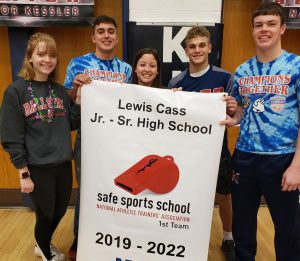Lewis Cass High School Receives National Athletic Trainers’ Association Safe Sports School Award Program recognizes high schools that prioritize keeping young athletes safe
 Walton, IN, 2019 – Lewis Cass Jr-Sr High School is the recipient of the National Athletic Trainers’ Association (NATA) Safe Sports School award for its Kings Athletic Programs. The award champions safety and recognizes secondary schools that have met the recommended standards to improve safety in sports. The award reinforces the importance of providing the best level of care, injury prevention, and treatment.
Walton, IN, 2019 – Lewis Cass Jr-Sr High School is the recipient of the National Athletic Trainers’ Association (NATA) Safe Sports School award for its Kings Athletic Programs. The award champions safety and recognizes secondary schools that have met the recommended standards to improve safety in sports. The award reinforces the importance of providing the best level of care, injury prevention, and treatment.
“Lewis Cass Jr-Sr High School is honored to receive this 1st Team recognition from NATA,” said Barrett Bates, Principal of Lewis Cass High School. “We remain committed to keeping our student athletes safe during physical education classes, team practices, and games so they can accomplish their own goals of great competition, winning records, fair sportsmanship, and good health. Our goal is to lead our athletics program to the highest safety standards for our players.”
“The health and safety of student-athletes is critical as it has both immediate and long-term effects,” said NATA President Tory Lindley, MA, ATC. “NATA created the ‘Safe Sports School Award’ to recognize and champion schools nationwide that are committed to enhancing safety in sports. We are proud to see the list of award recipients grow exponentially each year as schools see the immense value in holding themselves to best practices and policies that ensure a high standard of athlete care.11
In order to achieve Safe Sports School status, as Lewis Cass Jr-Sr High School did, athletic programs must do the following:
• Create a positive athletic health care administrative system
• Provide or coordinate pre-participation physical examinations
• Promote safe and appropriate practice and competition facilities
• Plan for selection, fit function and proper maintenance of athletic equipment
• Provide a permanent, appropriately equipped area to evaluate and treat injured athletes
• Develop injury and illness prevention strategies, including protocols for environmental conditions
• Provide or facilitate injury intervention
• Create and rehearse a venue-specific Emergency Action Plan
• Provide or facilitate psycho social consultation and nutritional counseling/education
• Be sure athletes and parents are educated about the potential benefits and risks in sports as well as their responsibilities


